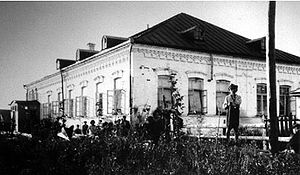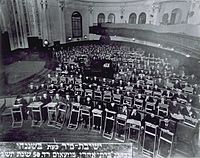- Mir yeshiva (Belarus)
-
 Old photo of Mir yeshiva, pre-war Poland.
Old photo of Mir yeshiva, pre-war Poland.
- This article concerns the pre-war Mirrer yeshiva in Poland. For the post-war yeshivas, see Mir yeshiva (Jerusalem), Mir yeshiva (Brooklyn) and Beth Hatalmud Rabbinical College.
The Mir yeshiva (Hebrew: ישיבת מיר, Yeshivas Mir), commonly known as the Mirrer Yeshiva or The Mir, was a Haredi yeshiva located in the town of Mir, Russian Empire (now Belarus). After relocating a number of times during World War II, it has evolved into two yeshivas, one in Jerusalem, with a subsidiary campus in Brachfeld, Modi'in Illit, and the other in Brooklyn N.Y.
Contents
Origins
The Mirrer Yeshiva was founded in 1815, twelve years after the founding of the Volozhin Yeshiva, by one of the prominent residents of a small town called Mir (then in White Russia, Russian Empire), Rabbi Shmuel Tiktinsky. After Rav Shmuel's death, his youngest son, Rabbi Chaim Leib Tiktinsky, was appointed rosh yeshiva. He was succeeded by his son, Rav Avrohom, who brought Rabbi Eliyahu Boruch Kamai into the yeshiva. During Rabbi Kamai's tenure the direction of the yeshiva wavered between those who wished to introduce the study of musar and those who were against it.
In 1903 Rabbi Kamai's daughter Malka married Rabbi Eliezer Yehuda Finkel, son of the legendary Rabbi Nosson Tzvi Finkel, the Alter of Slabodka, the who joined the yeshiva faculty in late 1906. Under his influence the yeshiva joined the musar movement definitively and Rabbi Zalman Dolinski of Radin was appointed as its first mashgiach.
World War I
With the outbreak of World War I in 1914, the yeshiva moved from Mir to Poltava, Ukraine. Following the death of Rabbi Kamai in 1917, Rav Eliezer Yehuda was appointed as rosh yeshiva, ushering in the golden age of the yeshiva. In 1921, The yeshiva moved back to its original facilities in Mir, where it blossomed, attracting the cream of the yeshiva students. The yeshiva's reputation grew, attracting students not only from throughout Europe, but also from America, South Africa and Australia, and the student body grew to close to 500.By the time World War II broke out there was hardly a rosh yeshiva of the Lithuanian school who had not studied in Mir. During this period Rabbi Yeruchom Levovitz joined the yeshiva as mashgiach in succession to Rabbi Zalman Dolinski.
In 1929, one of the yeshiva's prime students, Chaim 'Stutchiner', married the daughter of Rabbi Eliezer Yehuda Finkel. Rabbi Chaim was appointed to the faculty in 1935.
Escape to the East
The invasion of Poland in 1939 by Nazi Germany from the west and the Red Army from the east meant the yeshiva was unable to remain in Mir, which was now under Soviet Communist rule. Many of the foreign-born students left, but the bulk of the yeshiva relocated, first to Wilno, then temporarily in independent Lithuania, and then to Keidan, Lithuania. Not many months elapsed before Lithuania lost its independence to invading Soviet forces, and the future of the yeshiva was again in peril. The yeshiva was split into four sections: The "first division", under the leadership of Rabbi Chaim Leib Shmuelevitz as rosh yeshiva and Rabbi Yechezkel Levenstein as mashgiach, relocated to Krakinova; the other three divisions went to the three small towns of Ramigola, Shat and Krak.
Kobe
Main article: History of the Jews in JapanAs the German army continued to push to the east, the yeshiva as a whole eventually fled across Siberia by train to the Far East, en route to the USA. The yeshiva reopened in Kobe, Japan in March 1941.
While the Yeshiva was in Kobe, a controversy arose as to when to observe the Sabbath. The opinions of the Chazon Ish and Rav Yechiel Michel Tokachinsky were solicited. Ultimately, the students refrained from biblical Sabbath violations on two days, but kept it completely on only one of the days.
Several smaller yeshivas managed to escape alongside the Mirrer Yeshiva and, despite the difficulties involved, the leaders of the yeshiva undertook full responsibility for their support, distributing funds (mostly received from the American Jewish Joint Distribution Committee) and securing quarters and food for all the students. The heroism of the Japanese consul-general in Lithuania, Chiune Sugihara, who issued several thousand travel visas to Jews, permitting them to flee to the east, has been the subject of several books.
Shanghai
Main article: History of the Jews in ChinaA short time later Japan expelled the Jews from its mainland, and the yeshiva relocated again, to (Japanese-controlled) Shanghai, China, where they remained until 1947. In Shanghai, Rabbi Meir Ashkenazi, a Lubavitcher chasid who served as the spiritual leader of the Jewish refugees, arranged for the yeshiva to occupy the Beit Aharon Synagogue, built in 1920 by a prominent Jewish Shanghai businessman, Silas Aaron Hardoon. For the first few weeks, until funds could be sourced for provisions, the yeshiva community suffered from malnutrition.
Re-establishment after the war
Following the end of the war, the majority of the Jewish refugees from the Shanghai ghetto left for Palestine and the United States. Two deans of the Mir Yehiva, Rabbi Eliezer Yehuda Finkel and Rabbi Abraham Kalmanowitz, managed to escape from Europe before the war in 1939 and did not accompany the yeshiva to Shanghai. Rabbi Finkel went to Palestine where he established the Mirrer Yeshiva in Jerusalem, Israel. Rabbi Kalamanowitz went to the United States where he established the Mirrer Yeshiva Central Institute in Brooklyn, New York City. The yeshiva's leaders, Rabbi Shmuelevitz and Rabbi Levenstein, left Shanghai for New York in early 1947 with the last contingent of students. Three months later they set sail for Palestine, where they joined the faculty of the Mirrer Yeshiva that had been established by Rabbi Finkel. After their arrival in NY from Shanghai some of the yeshiva's older and most respected students established the Beth Hatalmud Rabbinical College in Brooklyn NY to serve as a continuation of the original yeshiva that went to Shanghai.
Prominent alumni
- Rabbi Yechezkel Abramsky
- Rabbi Leib Bakst
- Rabbi Abba Berman
- Rabbi Samuel Belkin
- Rabbi Shmuel Berenbaum
- Rabbi Boruch Borchardt
- Rabbi Elya Chazan
- Rabbi Zelik Epstein
- Dayan Michoel Fisher
- Rabbi Henoch Fishman
- Rabbi Shmuel Feivushevitz
- Rabbi Ze'ev Wolf Gold
- Rabbi Zev "Velvel" Gordon
- Rabbi Shalom Menashe Gottleib
- Lazar Gulkowitsch
- Rabbi Leib Gurwicz
- Rabbi Moshe Kaplan
- Rabbi Yisrael Mendel Kaplan
- Rabbi Yonah Karpalov
- Rabbi Yitzchok Isaac Krasilschikov
- Rabbi Aharon Kreiser
- Rabbi Dovid Kronglass
- Rabbi Dovid Kviat
- Rabbi Dovid Lifshitz
- Rabbi Aryeh Leib Malin
- Rabbi Isser Zalman Meltzer
- Rabbi Boruch Milikovsky
- Rabbi Herman N. Neuberger
- Rabbi Nachum Pertzovitz
- Rabbi Dovid Povarsky
- Rabbi Chaim Pinchas Scheinberg
- Rabbi Simcha Schepps
- Rabbi Moshe Schwab
- Rabbi Shimon Schwab
- Rabbi Moshe Shmuel Shapira
- Rabbi Naftoli Shapiro
- Rabbi Shaya Shimanowitz
- Rabbi Shimon Shkop
- Rabbi Chaim Shmuelevitz
- Rabbi Pesach Stein
- Rabbi Nosson Meir Wachtfogel
- Rabbi Yechiel Yaakov Weinberg
- Rabbi Samuel Wilensky
- Rabbi Yitzchok Wolfson
- Rabbi Gershon Yankelewitz
- Rabbi Shlomo Yosef Zevin
Prominent faculty
Rosh yeshivas
- Rabbi Shmuel Tiktinsky (1815-
- Rabbi Chaim Leib Tiktinsky
- Rabbi Eliyahu Boruch Kamai ( -1917)
- Rabbi Eliezer Yehuda Finkel (1917-1965)
- Rabbi Chaim Leib Shmuelevitz (1940-1979)
Mashgichim
- Rabbi Zalman Dolinski
- Rabbi Yeruchom Levovitz
- Rabbi Yechezkel Levenstein
See also
References
- Zinowitz, M. Hebrew: תולדות ישיבת מיר (Toldot Yeshivat Mir, Hebrew: The History of Mir Yeshiva). Tel Aviv, 1981.
- Sorasky, Aharon (September 2002). "Hebrew: פה המתגבר בתורה". קול התורה Kol Hatorah 53: 93–99.
- "Mir Yeshiva". Holocaust Encyclopedia. United States Holocaust Memorial Museum. 2007-06-25. http://www.ushmm.org/wlc/article.php?lang=en&ModuleId=10007090. Retrieved 2007-08-17.
External links
- The Mir Yeshiva from The Story of the Jewish Community in Mir An exhibition on the Yad Vashem website.
- Reeva Kimble's "Brief History of the Jews of Mir"
Mir Yeshiva Locations Faculty in Mir, Belarus Eliezer Yehuda Finkel • Avrohom Kalmanowitz • Eliyahu Boruch Kamai • Yeruchom Levovitz • Yechezkel Levenstein • Eliyahu David Rabinowitz-Teomim • Chaim Leib Shmuelevitz • Avrohom Tiktinsky • Chaim Leib Tiktinsky • Shmuel TiktinskyFaculty in Jerusalem, Israel Eliezer Yehuda Finkel • Asher Arieli • Yitzchok Ezrachi • Binyomin Beinush Finkel • Eliyahu Boruch Finkel • Gedaliah Finkel • Nosson Tzvi Finkel • Nochum Partzovitz • Chaim Leib ShmuelevitzFaculty in New York, United States Shmuel Berenbaum • Ezriel Erlanger • Eliezer Ginsburg • Avrohom Kalmanowitz • Osher Eliyahu Kalmanowitz • Dovid KviatFaculty in Brachfeld (Modi'in Illit, Israel) Aryeh Leib Finkel
Categories:- Yeshivas of Belarus
- Educational institutions established in 1815
- History of Belarus (1795–1918)
- Jews and Judaism in Belarus
- Jews and Judaism in China
Wikimedia Foundation. 2010.

